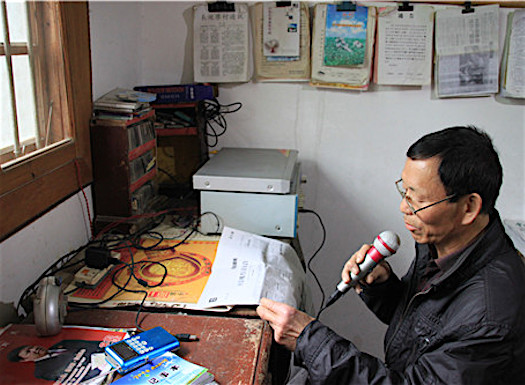In these days of internet and so much media, is there still a place for radio?
A special program produced by China Radio International concludes the answer is yes.
‘Radio is just like three meals a day,” says one of the contributors to a program, broadcast earlier this year, called My Encounter with Radio.
Radio in the rural provinces of China was often heard on village loudspeakers in the past, but many of these have now been silenced.
However, in one village, a farmer has revived the local loudspeaker radio tradition.
“Actually such a village loudspeaker was very popular in rural China in the 1960s to 1970s, when the country was experiencing a rough period in history and constantly exploring the twists and turns in agricultural development. At that time, local radio stations used to be the main source of information for farmers. But as the “people’s communes” collapsed in the 1980s, many village radio stations have faded into history, along with its collective memories shared by the previous generation.”
In Chang Long village, after 30 years of silence, the village loudspeaker rediscovered its vigour, and all this is owed to a local farmer.
59-year-old Liao Jinying is the founder of his family radio station in Chang Long village. Like many other villagers of his generation, Liao is a lifelong radio fan. However, his insistence on broadcasting does not only come from nostalgia.
“At that time none of us had mobiles. Some families had televisions and telephones, while most of the villagers didn’t. Information passed from mouth to mouth, like it’s time for sowing seeds, it would rain tomorrow, it was so inconvenient. I was elected as a village leader then, I just wanted to do something that could help. Then I came up with the idea of setting up a village radio station.”
Liao Jinying started his radio station in 2003. At that time, his annual income was only 2,000 yuan, or 300 US dollars. He spent 500 yuan, bought a DVD player, a tape recorder, two loudspeakers, and a microphone. With all the simplest facilities, his life is engaged with radio. Since then, more than 1,000 villagers living within the radius of 3 square kilometers could have been reached every day.
Each morning at 6’o clock, Liao Jinying’s voice spread through the countryside via the two loudspeakers.
“I usually broadcast a weather report in the morning, then relay some local news and national news. 12’o clock is the ending time of the first half of the school day, so I will announce the time, calling the parents to pick up their children from the village school, and play some Huangmei Opera, country music or popular music during lunch time, plus some agricultural production knowledge and skills. The last segment of broadcasting is half past 6 in the afternoon. The radio station works 3 times a day, lasting for 30 to 40 minutes per segment. On big days such as national holidays and spring festival, I will work for extra hours and the radio plays all day.”
The program also showcases a range of views from Chinese and international observers about radio’s place in the modern world.
David Lai tells the program:
“I don’t think that radio will die. I don’t think the way that radio is presented will die. The advantages of radio are of course easy and fast access, and without the concentration of your eyes, you can get information very easy and very fast. You can walk around with the radio and you get to know what’s going on in China or around the world just by listening to someone telling you the information, it’s like a conversation with a friend. On the question that whether or not radio will die, I foresee in the future, maybe FM radio signals may be replaced by higher-quality, more stable streams online or through some other medium. But I think radio itself will still live on, because now with the internet, we’ve got things like podcasts that are basically radio programs that you are listening to without getting the feeling that you are listening to live radio. But in a sense you are listening to radio programs, so I think it will still live on but maybe in a different kind of format.”
But another commentator says radio is an antique:
“For those of us who were born in the 1990s, radio is like an antique, or something of history. We usually listen to radio in that context. But I’ll describe that kind of feeling with an analogy, watching TV and films gives you the feeling of walking on an avenue in a metropolis, while listening to radio makes you feel like you are walking in a quiet, tree-lined path.”
Luo Yu Wu Ting has been working with radio for more than 6 years. She says she has always been obsessed with listening to radio and sharing through radio:
“The special charm of radio is that it strikes a responsive chord among listeners. They believe you would express for them. And working as a radio host, you can express your love for your listeners; this is exactly why I’m obsessed with radio.”
You can find the full program at China Radio International’s website.
My Encounter With Radio is one of the finalists in the 2016 ABU Prizes, to be awarded in October in Bali.

